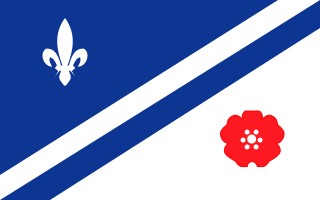Related Research Articles
Joual is an accepted name for the linguistic features of Quebec French that are associated with the French-speaking working class in Montreal which has become a symbol of national identity for some. Joual has historically been stigmatized by some, and celebrated by others. While Joual is often considered a sociolect of the Québécois working class, many feel that perception is outdated, with Joual becoming increasingly present in the arts.

Franco-Ontarians are Francophone Canadians that reside in the province of Ontario. Most are French Canadians from Ontario. In 2021, according to the Government of Ontario, there were 650,000 Francophones in the province. The majority of Franco-Ontarians in the province reside in Eastern Ontario, Northeastern Ontario, and Central Ontario, although small francophone communities may be found in other regions of the province.
The Official Languages Act is a Canadian law that came into force on September 9, 1969, which gives French and English equal status in the government of Canada. This makes them "official" languages, having preferred status in law over all other languages. Although the Official Languages Act is not the only piece of federal language law, it is the legislative keystone of Canada's official bilingualism. It was substantially amended in 1988. Both languages are equal in Canada's government and in all the services it controls, such as the courts.
This article presents the current language demographics of the Canadian province of Quebec.

The official languages of Canada are English and French, which "have equality of status and equal rights and privileges as to their use in all institutions of the Parliament and Government of Canada," according to Canada's constitution. "Official bilingualism" is the term used in Canada to collectively describe the policies, constitutional provisions, and laws that ensure legal equality of English and French in the Parliament and courts of Canada, protect the linguistic rights of English- and French-speaking minorities in different provinces, and ensure a level of government services in both languages across Canada.

Franco-Albertans are francophone residents of the Canadian province of Alberta. Franco-Albertans may also refer to residents of Alberta with French Canadian ancestry, although publications from the government of Alberta use the term Franco-Albertan to refer to its francophone residents. In the 2016 Canadian Census, there were 86,705 Albertans that stated their mother tongue was French. In the same census, there were 411,315 Albertans that claim partial or full French ancestry.

Joseph Quesnel was a French Canadian composer, poet and playwright. Among his works were two operas, Colas et Colinette and Lucas et Cécile; the former is considered to be the first Canadian opera and probably of North America.
Founded in 1947, the Mouvement national des Québécoises et des Québécois (MNQ) is a federation that groups together the various patriotic organizations in Quebec, Canada. Its membership includes 19 National Societies and Saint-Jean-Baptiste Societies (SSJB) throughout all of Quebec.

École secondaire Le Caron is the only French first language high school located in Penetanguishene, Ontario, Canada. It serves the French population of Simcoe County, and it is managed by Conseil scolaire Viamonde.

Montreal Road, also known as Ottawa Road #34, is a major east-west Ottawa road that links Lowertown to Vanier and the farther eastern neighbourhoods of Ottawa. Until downloading in 1998, it was part of the provincially managed Highway 17B.
Aurélien Bélanger was an Ontario political figure. He represented Russell in the Legislative Assembly of Ontario as a Liberal and Independent Liberal from 1923 to 1929 and Prescott as a Liberal from 1934 to 1948.
The Estates General of French Canada were a series of three assizes held in Montreal, Quebec, Canada between 1966 and 1969. Organized by the Ligue d'action nationale and coordinated by the Fédération des Sociétés Saint-Jean-Baptistes du Québec (FSSJBQ), the stated objective of these Estates General was to consult the French-Canadian people on their constitutional future.
Roger Le Moine was an emeritus professor of Québec and French literature at the University of Ottawa.
Linda Cardinal is a Franco-Ontarian political scientist. She is a University Professor and a Canada Research Chair in Canadian Francophonie and Public Policies at the University of Ottawa. Cardinal was elected a Fellow of the Royal Society of Canada in 2013 and honoured with the Ordre des Palmes Académiques and Member of the Order of Canada. She was also the first coordinator of the francophone studies program at the University of Ottawa.
Jean-Paul Vinay was a French-Canadian linguist. He is considered one of the pioneers in translation studies, along with Jean Darbelnet, with whom Vinay co-authored Stylistique comparée du français et de l'anglais (1958), a seminal work in the field.
S.O.S. Montfort was a Franco-Ontarian movement that fought to save Montfort Hospital, the only primarily francophone hospital in Ontario, after the Mike Harris government announced it would be shutting down the hospital in 1997. One of the largest mass movements in Franco-Ontarian history, the level of mobilisation it saw and the ultimate success of the campaign has been noted as a significant moment in the struggle for French-language rights in Ontario and in the wider Canada.

The 2018 Franco-Ontarian Black Thursday occurred on 15 November 2018, when the government of Ontario, led by Doug Ford, announced a number of cuts to Franco-Ontarian institutions in the province, notably the elimination of the office of the French Language Services Commissioner and of the soon-to-be-opened Université de l'Ontario français. The cuts provoked a significant backlash from the Franco-Ontarian community, leading to the largest mass mobilisations in Franco-Ontarian history, surpassing those of SOS Montfort two decades earlier, and leading to the government of Ontario mostly backing down from the cuts.
Almanda Walker-Marchand was a Canadian feminist and founder of the Fédération des femmes canadiennes-françaises.
The Sturgeon Falls Education Crisis was a 1971 language-rights conflict in Ontario centered on the provision of French-language education for the Franco-Ontarian community in Sturgeon Falls, Northern Ontario.
Paul Wyczynski, OC, FRSC was a Polish-born Canadian literature scholar who pioneered the study of French Canadian literature. A specialist of the work of Émile Nelligan, he spent his academic career at the University of Ottawa, where he founded the Centre de Recherche en Civilisation Canadienne-Française.
References
- ↑ Belluco, Joanne (September 23, 2019). "Nos Histroires, Notre Histoire – Épisode 2 : Le Mouvement "C'est L'Temps"". onfr.tfo.org (in French). Retrieved September 24, 2019.
- ↑ "IDÉOmédia » Rebelles: C'est l'temps!" (in Canadian French). Retrieved September 24, 2019.
- ↑ Centre de recherche en civilisation canadienne-française (July 18, 2017). "The issue of French services in Ontario – in the New York Times". Vie française dans la capitale (in French). Retrieved September 24, 2019.
- ↑ "Women on the Front Line of Language Rights in Ontario: A Chronicle of Three Events between 1916-1990". Voyageur Heritage. January 3, 2014. Retrieved September 24, 2019.
- ↑ "French Language Services Act (Ontario)". The Canadian Encyclopedia. Retrieved October 31, 2020.
- ↑ Centre de recherche en civilisation canadienne-française (July 18, 2017). ""C'est l'temps!"". Vie française dans la capitale (in French). Retrieved September 24, 2019.
- ↑ "Accueil". crccf.uottawa.ca. Retrieved September 24, 2019.